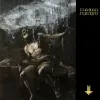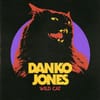
Shimmering Facets of Satanic Art
With their new album, «I Loved You At Your Darkes», Behemoth prove once again that they belong to the avant-garde of metal.
New albums and EPs reviewed

With their new album, «I Loved You At Your Darkes», Behemoth prove once again that they belong to the avant-garde of metal.

Zeal & Ardor present a powerful work: «Stranger Fruit» is the preliminary realisation of an idea. The album impresses with its immense diversity, although the sound can be reduced to a simple formula.

«À Ta Merci» is a debut album that only comes along once in a generation. The first work by French singer Fishbach is already a classic.

With «Hymns To The Night», Lea Porcelain not only present their debut, but also the most fascinating album of the year. A journey to Augsburg and into the centre of their universe.

Adna's third album, «Closure», is the culmination of her unmistakable sound for the time being.

No other album has breathed new life into supposedly dead rock music like «Wild Cat». There is not only circumstantial evidence for this, but also tangible proof.

Zeal & Ardor are the subject of international hype like no other music project in Switzerland. Listen to their debut album, «Devil Is Fine», and you'll know why.

«Colicky» is the name of the latest work from Self Defense Family. But the mini-album is a strenuous listening experience.